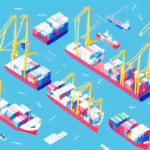Understanding FTR Exemptions
As an exporter, you're likely familiar with the various regulations and laws that govern international trade. One such regulation is the Foreign Trade Regulations (FTR), enforced by the U.S. Census Bureau. The FTR ensures that exporters comply with specific reporting and recordkeeping requirements related to the export of goods from the U.S.
One way to ensure compliance with the FTR is to apply for an exemption, which can exempt certain exports from reporting requirements. FedEx Ship Manager, a popular shipping solution, allows users to request FTR exemptions directly through their platform. However, not all FTR exemptions are available through FedEx Ship Manager, and discovering this can be a frustrating experience for shippers.
What are FTR Exemptions
FTR exemptions are specific scenarios where a shipment is exempt from filing Electronic Export Information (EEI) in the Automated Export System (AES). This system electronically captures export data, providing the U.S. government with essential export statistics and contributing to the enforcement of U.S. export regulations.
When an item qualifies for an FTR exemption, the exporter is generally exempt from filing EEI or other FTR documentation. This exemption can significantly streamline the shipping process, reducing the time and resources spent on compliance and reporting.
It's crucial to note that not all shipments are eligible for FTR exemptions. The U.S. government has strict guidelines and regulations in place to determine which shipments qualify. For instance, shipments to certain countries or shipments of specific goods may not be eligible for FTR exemptions. Exporters must thoroughly research and understand these guidelines to ensure compliance with U.S. export laws.
Additionally, even if a shipment qualifies for an FTR exemption, it may still be subject to other export regulations and requirements. Exporters should always consult with legal and compliance experts to ensure that all necessary documentation and procedures are followed to avoid potential penalties or legal issues.
Importance of FTR Exemptions
Complying with FTR regulations is critical for exporters to avoid penalties and fines. FTR exemptions can reduce the complexity and cost of compliance, making international shipping more manageable. These exemptions are particularly crucial for small businesses that may not have dedicated resources to navigate regulatory requirements. While not all shippers can benefit from FTR exemptions, those that do can enjoy reduced costs and improved logistics.
It's important to recognize that FTR exemptions are not a one-size-fits-all solution. Each exemption has specific requirements that must be met, and shippers must ensure they meet these requirements before claiming an exemption. Some exemptions may apply only to certain types of goods or destinations. Therefore, it's essential for shippers to carefully review the FTR regulations and consult with experts to determine which exemptions are applicable to their specific situation.
Using FedEx Ship Manager for FTR Exemptions
Available Exemptions in FedEx Ship Manager
While FedEx Ship Manager allows shippers to request FTR exemptions, not all FTR exemptions are accessible through their platform. Users must manually research which FTR exemptions are available on FedEx's platform for their specific shipment’s commodity.
FedEx does not provide automated tools for tracking a shipment's status when requesting FTR exemptions. To determine which FTR exemptions exist within FedEx Ship Manager for your shipment's commodity, you must review the FTR regulations and cross-check them with FedEx's platform capabilities. This process requires extra effort and can be time-consuming.
It's important to ensure that even if an FTR exemption is available in FedEx Ship Manager, it may not be applicable to your specific shipment. Shippers must verify that they meet all the requirements and criteria for the exemption before requesting it. Failure to comply with FTR regulations can result in penalties and fines.
Limitations on FTR Exemptions in FedEx Ship Manager
FedEx Ship Manager's limitations regarding FTR exemptions primarily revolve around the type of commodity being shipped and its destination. For example, FTR exemptions for non-licensed shipments to Canada may not be available through FedEx Ship Manager. This can pose challenges for shippers who rely on these exemptions to simplify their export process.
If you discover that the FTR exemption you need is not available in FedEx Ship Manager, you must resort to alternative methods to comply with FTR regulations. This additional work can add unnecessary costs and time delays to the shipping process.
Even if an FTR exemption is available in FedEx Ship Manager, it remains the shipper's responsibility to ensure that all necessary documentation and information are provided. Failure to do so can result in penalties and fines.
Moreover, FTR regulations are subject to change, and it's the shipper's responsibility to stay updated on any updates or revisions. While FedEx provides resources and information to help shippers comply with FTR regulations, it's ultimately the shipper's responsibility to ensure compliance.
Key Considerations When Requesting FTR Exemptions
When using FedEx Ship Manager to request FTR exemptions, consider the following:
- Shipment Eligibility: Confirm that your shipment qualifies for an FTR exemption via FedEx Ship Manager.
- Documentation: Prepare detailed and precise documentation to support your FTR exemption request.
- Deadlines: Review and adhere to the time and deadline requirements for requesting FTR exemptions.
- Timely Submission: Submit the FTR exemption request through FedEx Ship Manager promptly to avoid delays.
It's crucial to understand that not all shipments are eligible for FTR exemptions. Reviewing the regulations and guidelines set by the Bureau of Industry and Security (BIS) can help determine if your shipment qualifies for an FTR exemption. Additionally, FTR exemption requests may require additional information or documentation depending on the nature of the shipment. Therefore, thoroughly researching and preparing all necessary materials before submitting the request through FedEx Ship Manager is essential.
Navigating the FTR Exemption Process
Tips for Navigating the FTR Exemption Process
Understanding the FTR exemption rules involves navigating a complex set of regulations, which can be challenging for those unfamiliar with them. Here are some tips to help you navigate the FTR exemption process effectively:
- Read the Regulations: FTR exemptions are highly specific and can change frequently. Ensure you are up-to-date on the latest changes in the regulations.
- Research Your Shipment’s Commodity: Determine if the commodity qualifies for an FTR exemption by reviewing the relevant categories and classifications.
- Identify the Correct FTR Exemption: With over a dozen FTR exemptions, it's crucial to understand and apply the right one to your shipment based on its specific circumstances.
- Be Prepared to File EEI if Needed: If the shipment does not qualify for an FTR exemption in FedEx Ship Manager, be ready to file EEI and other necessary FTR documentation through alternative channels.
Each shipment is unique, and it's vital to evaluate the specific circumstances to determine if it qualifies for an FTR exemption. Additionally, FTR exemptions are subject to change, so staying informed about the latest regulations and amendments is crucial.
Lastly, consider partnering with a trusted logistics provider familiar with the FTR exemption process. They can offer guidance and support to ensure that your shipment complies with all regulations and requirements, minimizing the risk of delays or penalties.
Common Mistakes to Avoid When Requesting an FTR Exemption
Requesting an FTR exemption can be a complex task in FedEx Ship Manager. Here are some common mistakes to avoid:
- Providing Inaccurate or Incomplete Documentation: Ensure all required documents are accurate, complete, and submitted on time.
- Entering Incorrect Information: Double-check all information entered into FedEx Ship Manager to avoid misspellings or incorrect details.
- Missing Submission Deadlines: Be aware of and adhere to submission deadlines for FTR exemption requests to prevent delays.
- Assuming All Exemptions are Available: Not all FTR exemptions are accessible through FedEx Ship Manager. Always verify availability before proceeding.
It's essential to verify whether the commodity being shipped is eligible for an FTR exemption to avoid delays or rejection of your request. Additionally, thoroughly review all information and documentation before submitting your request to avoid mistakes or inaccuracies.
How to Monitor the Status of Your FTR Exemption Request
After submitting an FTR exemption request in FedEx Ship Manager, it's important to monitor the status of your request proactively. FedEx systems do not automatically provide updates on FTR exemption requests, so exporters must take the initiative to check the status regularly.
Log in to the FedEx platform to review the expected delivery date and any updates on your shipment's status. Keeping track of your request's progress can help you address any issues promptly and ensure timely compliance with FTR regulations.
Handling Denied FTR Exemption Requests
If your FTR exemption request is denied in FedEx Ship Manager, exporters must explore alternative methods to comply with FTR regulations. This includes filing EEI and other necessary FTR documentation manually outside of the FedEx platform or partnering with third-party providers that can assist with FTR compliance.
Understanding the reasons for denial can help you address any issues and improve the chances of approval in subsequent requests. Consult with compliance experts or review the specific requirements of the FTR exemption to rectify any shortcomings in your request.
Working with Third-Party Providers
Benefits of Working with Third-Party Providers for FTR Exemptions
Collaborating with a third-party provider that specializes in FTR compliance can simplify the process of navigating the various FTR exemptions in FedEx Ship Manager. These providers offer expertise in researching the appropriate FTR exemptions and ensure that accurate and complete documentation is submitted when making requests through FedEx Ship Manager.
Third-party providers can streamline compliance procedures with the FTR, allowing exporters to capitalize on available exemptions more efficiently. Their specialized knowledge reduces the risk of errors and increases the likelihood of successful exemption requests, ultimately saving time and resources.
Best Practices for Managing FTR Exemptions
Best Practices for Managing Your FTR Exemptions in FedEx Ship Manager
To effectively manage FTR exemptions in FedEx Ship Manager, shippers should adopt the following best practices:
- Stay Informed: Maintain up-to-date knowledge of the latest FTR exemptions and regulations to ensure ongoing compliance.
- Verify Commodity Eligibility: Double-check if your commodity qualifies for the desired FTR exemption.
- Accurate Documentation: Gather precise and accurate documentation required for your FTR exemption request.
- Timeline Management: Establish and adhere to a timeline for requesting FTR exemptions to ensure timely submission of requests.
- Partner with Experts: Collaborate with third-party experts or logistics providers for guidance and support throughout the exemption process.
- Regular Monitoring: Continuously monitor the status of your exemption requests and shipments to address any issues promptly.
Implementing these best practices helps ensure that your FTR exemption requests are handled efficiently and that your shipments comply with all relevant regulations, minimizing the risk of delays or penalties.
Conclusion
While requesting an FTR exemption through FedEx Ship Manager can significantly reduce the effort required to comply with FTR regulations, it's important to recognize that not all FTR exemptions are available through the platform. As the regulatory landscape continues to evolve, shippers must stay informed about the latest FTR rules and maintain vigilance regarding any changes.
To effectively manage the FTR exemption process, consider partnering with FTR experts who have comprehensive experience navigating the exemption procedures. Their expertise can help ensure compliance, streamline your export operations, and minimize the risk of delays or penalties associated with FTR regulations.






















